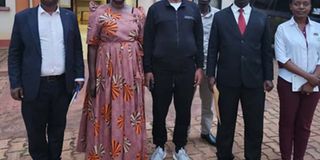Ubos puts districts on high alert ahead of 2023 census

Ubos executive director Chris Mukiza (centre), Gulu deputy CAO Charles Lagu (2nd right), Ubos spokesperson John Igumira (left) and other Gulu District leaders after a meeting in Gulu on Saturday. PHOTO/TOBBIAS JOLLY OWINY
What you need to know:
The statistics body is using the ongoing mapping exercise to capture geo-coordinates of every household so that it is easy to generate an approximation plan for the census.
The Uganda Bureau of Statistics (Ubos) has warned local governments against falsification of data as the country heads for a national census.
While conducting a regional appraisal of the ongoing census mapping in the Acholi Sub-region at the weekend, Mr Chris Mukiza, the Ubos executive director, told leaders that the bureau will not condone a repeat of ghost statistics by districts as it occurred in the last census.
“Dirty statistics is not of quality and is useless since it will misinform the planning, investment decisions, implementation and monitoring and evaluations. I am making this call to all districts involved in the statistical activities to keep off it,” Mr Mukiza said.
He added that to raise indicative planning figures, some districts in the past inflated population figures.
“We will not consider such estimates, we must be aware of the importance of clean statistics. Forging statistics is criminal and we need clean figures like we need clean money or water.”
Mr Mukiza also put the district chairpersons and the chief administrative officers on high alert ahead of the exercise.
“Although we are going to democratise and decentralise statistics, let us get real figures so that we can plan for the people that exist, not ghosts. We don’t want to get duplicates of statistics of people, schools, and health centres for budget purposes,” he said.
Gulu
During an engagement with Gulu District authorities, Mr Charles Lagu, the chief administrative officer, appealed to the bureau to find ways of involving thousands of people who remain trapped in the border dispute between Gulu and Amuru districts in the entire programme.
“We are having an outstanding border dispute with the neighbouring district of Amuru. As we prepare to go in for this exercise, we thought we should inform Ubos ahead of time to see ways of ensuring that the people living within the contested area are not left out,” Mr Lagu said.
A contested area (Oroko parish in Palaro Sub-County) is being run by the Gulu administration, but Amuru leaders reportedly went ahead to carry out mapping in the area.
Mr Lagu warned that the matter could escalation conflicts in the area if ignored during the census.
“We have a livestock market, a school, a health centre and all those facilities are administered by Gulu District and we have representation to the council from those areas,’’ he said.
Despite the conflict, Ms Vicky Atim, the vice chairperson of Gulu, told the Ubos delegation that a team had already been designated by the Local Government Ministry to carry out boundary demarcation.
“A team has been constituted, at an appropriate time, the team will go on the ground to professionally demarcate the boundaries of the two districts,” Ms Atim said.
Mr Mukiza, however, assured the Gulu leaders that the boundary dispute will not affect the census in the area.
“We have a system where coordinates of every household are being plotted, and we don’t want to have duplication. If Gulu district does the counting, there is no way Amuru will force itself to enter data of households with the same coordinates,” he said.
Data units
Mr Mukiza also said the bureau is already establishing data units in all districts to enable them effectively conduct the census.
“We shall require districts to create well-established statistical units and once they establish them, we shall support in capacity development of those staff, including equipping them with ICT equipment,” he said.
During the ongoing mapping exercise, Ubos says it is plotting the geo-coordinates of every household to generate an approximation to properly plan for the census.
The body is preparing to undertake the National Population and Housing Census in August at a cost of Shs336b.
Uganda is currently estimated to have a population of about 45 million people, 75 percent of which are below the age of 15 years.
The bureau says approximately 95 percent of the households across the country have been mapped in the ongoing exercise and that it projects to cover five percent within the next fortnight.




